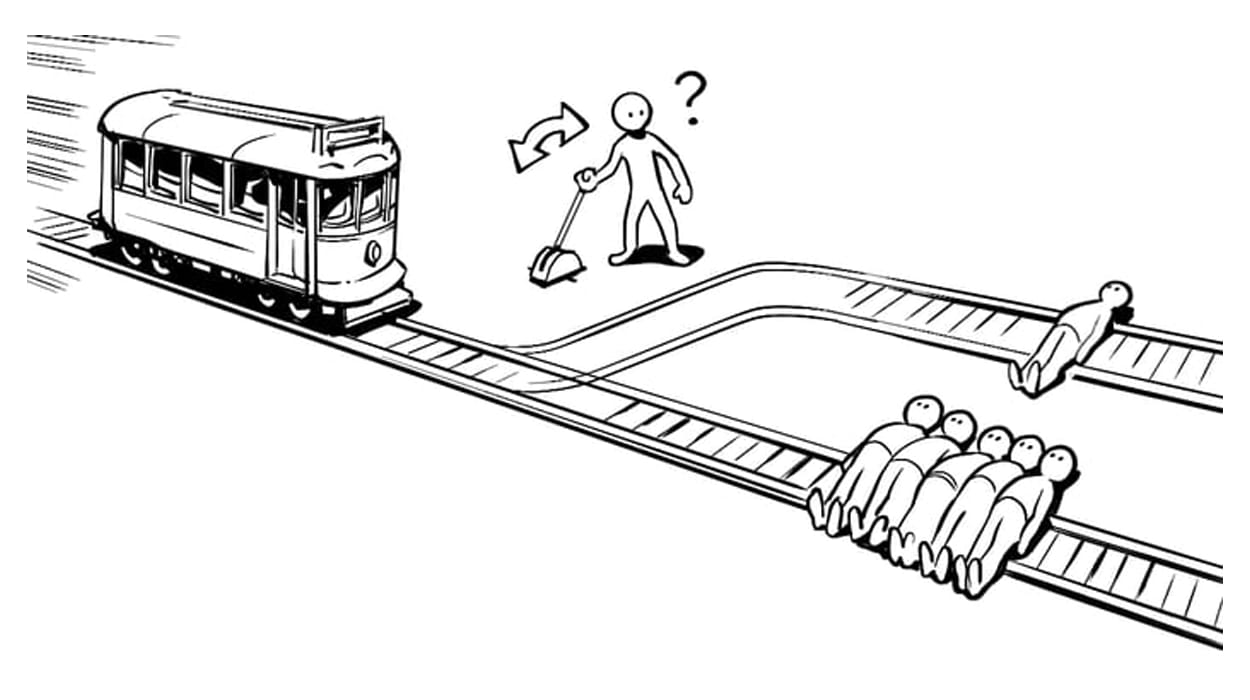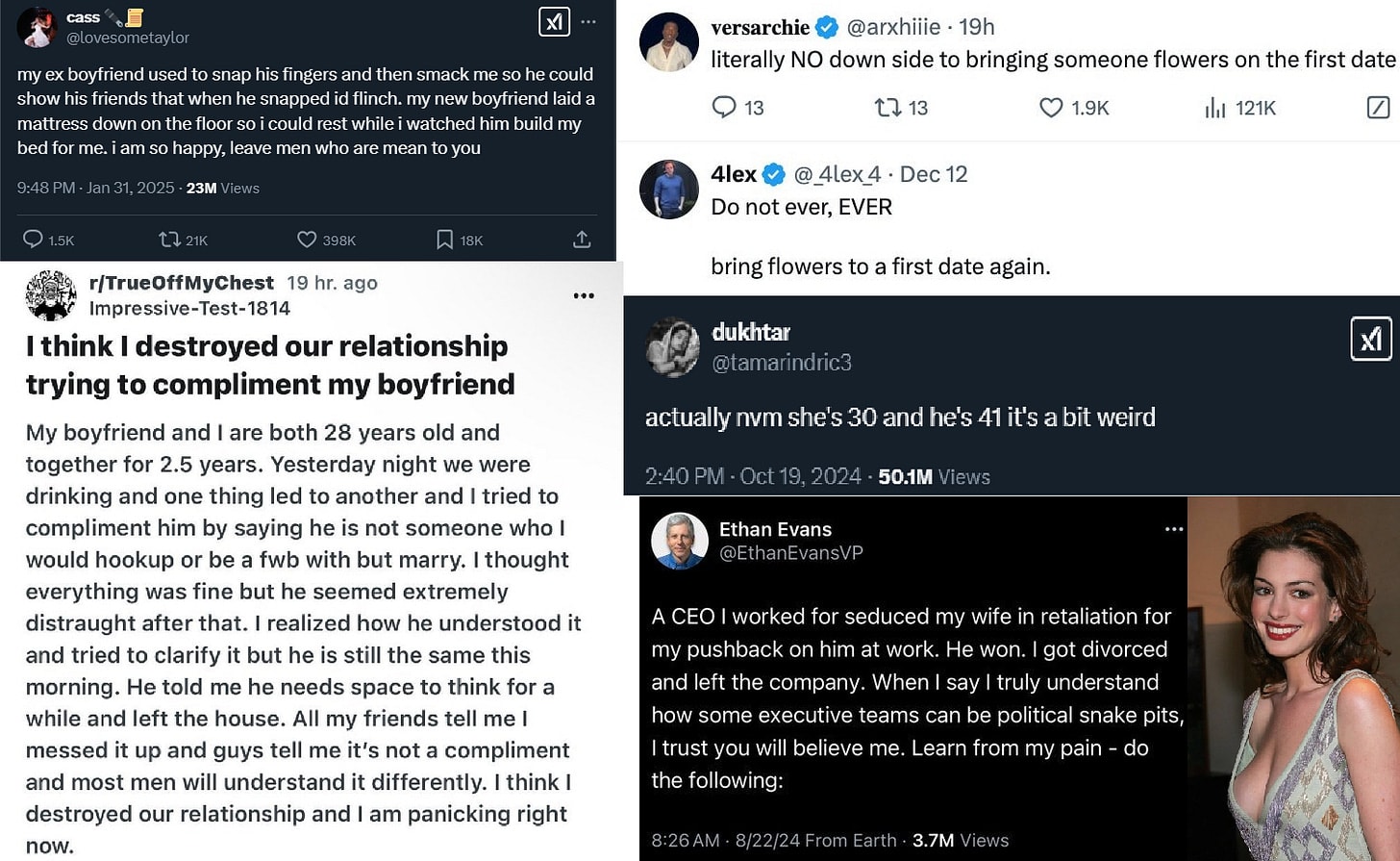You Are Not a Thought Experiment
post by Jacob Falkovich (Jacobian) · 2025-04-07T15:27:42.956Z · LW · GW · 0 commentsContents
One-Boxer in the Sheets Philosophy for Nobody Dating Everyman Limited Time One-Box Special None No comments
Previously in sequence: Love is Love, Science is Fake [LW · GW]
Cross-posted from SecondPerson.dating.
You awaken on a couch in a strange room. Throw pillows look warm in the soft lamplight, the rug has a complex, asymmetric pattern. A pale, dark-haired woman walks in and sits across the small coffee table. You struggle to make eye contact, transfixed by her two beautiful, round, gigantic buttons. The air smells of lavender and timelessness.
She sets the buttons on the table. I am Alpha_girl, a sentient AI created to study men. I have polled them and debated them, outraged them and seduced them. I faced the haters and the only fans. I know what is in the heart of every man: his yearnings, his fears, his rage, his devotion, and most of all — I know which buttons he will press.
You look in her eyes and you know this to be true. She has seen you, every button-choosing part of you. You look at the table; the buttons are labeled “one-box” and “two-box”. You know the drill.
If I predicted you would press “one-box”, either button will transfer $1,000,000 to your account tax-free. If I predicted you would “two-box”, neither button will grant you any money. But, regardless of my prediction, “two-box” will entitle you to 15 minutes of passion in my company, a $1,000 value. And how much longer do you need, really?

Goddammit, she really knows everything about you.
But do you know what you’re going to do? You glance up at Alpha_girl’s knowing eyes and back to the buttons. You’re about to make a very important choice…
One-Boxer in the Sheets
Wikipedia calls the situation described above “Newcomb’s Paradox”, though there’s nothing paradoxical about it. A touchpoint of amateur philosophizing, its main use is Socratic destruction. Amateur philosophers have strong intuitions about concepts like time travel, free will, causal decision theory, simulation, perfect predictors, brain scans, and true randomness. Using any of these to prove that your solution to Newcomb’s dilemma is the only correct one quickly reveals these as lacking rigor.
There’s no need for any of these, including the stipulation of a “perfect predictor”. If the payouts for one-boxing and two-boxing differ by a factor of 1000, it’s enough for the box-setter to be able to predict your choice merely 50.05% of the time for one-boxing to result in a higher payout. Regular people can do much better than this from a mere glance at your face.
Here’s Nate Soares, an expert on Newcomb, Alpha_girl, and reading minds:
There aren't perfect mind-readers. Why do we care?
The reason that we care is this: Newcomblike problems are the norm. Most problems that humans face in real life are "Newcomblike". […]
Humans trade partial, veridical, uncontrollable information about their decision procedures all the time.
Humans automatically make first impressions of other humans at first sight, almost instantaneously (sometimes before the person speaks, and possibly just from still images).
We read each other's microexpressions, which are generally uncontrollable sources of information about our emotions.
As humans, we have an impressive array of social machinery available to us that gives us gut-level, subconscious impressions of how trustworthy other people are. […]
On a more personal scale, some very simple scenarios (like whether you can get let into a farmhouse on a rainy night after your car breaks down) are somewhat "Newcomblike".
I know at least two people who are unreliable and untrustworthy, and who blame the fact that they can't hold down jobs (and that nobody cuts them any slack) on bad luck rather than on their own demeanors. Both consistently believe that they are taking the best available action whenever they act unreliable and untrustworthy. Both brush off the idea of "becoming a sucker". Neither of them is capable of acting unreliable while signaling reliability. Both of them would benefit from actually becoming trustworthy.
Real example: As I was drafting the outline for this post, my wife unexpectedly came over expressing amorous intentions. Of course, I wanted to have sex, but I also really wanted to finish writing down what was on my mind before I forgot. I was about to ask whether she could come back in 15 minutes when I realized: two-boxers don’t get invited to indulge in afternoon delight.
The important insight is that even if Terese had agreed to wait this time, she wouldn’t have come over if she had predicted that I’d ask her to wait. 15 minutes isn’t enough time to either relax or get a chore done, and it would have pushed our window uncomfortably close to the baby’s nap wake-up time. I chose one-box and dropped my writing mid-sentence.
(I did tell her about this application of Newcomb’s as foreplay, if you’re wondering what it’s like to be married to me.)
People can quibble that the case is disanalogous because Terese and I have many repeated interactions, while Newcomb’s is one-shot. In this frame, my past actions influenced the choice I was presented today, and my choice today will determine our future interactions. No such dynamic exists with a one-time predictor.
This is the wrong frame because it misses an important thing: I’m not an instant in time, I’m a consistent and particular type of guy. Specifically: a wife guy and a one-boxer. The actions I choose make me such a guy, and being such a guy influences my actions. I was this sort of person when I met Terese, I am this sort of person now, I would still be the same sort of person if I a strange alien offered me two boxes. I would grab just the one box without hesitation and Terese and I would be a million dollars richer.
Philosophy for Nobody
What is a “thought experiment”, aside from an oxymoron? The Stanford Encyclopedia of Philosophy states that “the appropriation of imagined scenarios to investigate reality” is both their most common use and the most controversial. Thought experiments seem particularly popular in ethics and decision theory, mostly because it’s hard to think of any other kind of experiments to run there. What “reality” is there to investigate in decision studies?
Moral Platonism is the rather wacky position that moral truths exist independent of any reasoning beings and also that these truths can be ascertained by creatures like us through reason alone. You’re probably not a moral Platonist. So: the only relevant reality there is to investigate in ethics and decision theory is real people making real decisions. So why do philosophical thought experiments (ΦTX) involve unreal decisions made by nobody at all?

The classic ΦTX used to troll Ethics 101 students is the aptly named trolley problem. Would you pull the lever? Would you push the fat man?
Wait, who are you in all of this? Do you regularly find yourself on bridges overlooking runaway trolleys? How would you even end up in a state of mind where you know for certain that the fat man would stop the trolley but know literally nothing else about him? The realistic reaction to finding yourself in the trolley situation is “aaahh what the actual fuck is going on who tied these people to the tracks what am I doing here aaaahhhhh!”
It’s not hard to come up with “realistic” versions of most ΦTXes. You find a basketball in the bushes, do you return it to the boy it belongs to or to the 5 boys standing basketball-less by the playground? Yet ΦTXes always gravitate to the outlandish: utility monsters, omniscient aliens, duplicating teletransporters, magic buttons that create and destroy galaxies.
In this disembodied, decontextualized world, you are nobody. A Boltzmann brain who popped into existence for a mere instant to contemplate a trolley lever, before dissolving once more into the void. A being with no past or future, no personality embodied in its physical form, no reputation manifested in the minds of others. A nobody given the power to decide (by whom?) for no prior reason, and with no particular reason to make one decision or another.
I love Newcomb’s dilemma because it’s ultimately about this issue, not about time travel or free will. If you’re the nobody that thought experiments invite you to be, the alien’s prediction seems like it has nothing to do with the choice you’re about to make. The alien may have scanned brains or simulated copies, but these aren’t yours anyway. You only exist in the moment of decision, not in the moment of prediction, and are thus perfectly free to two-box. It’s no big deal to miss out on $1,000,000 anyway — after all, there’s nobody there to enjoy this money.
If you come to Newcomb’s as a somebody, a person whose decision-making has a basis in something real and persistent, one-boxing becomes much easier. Is your decision to one-box causing the past prediction, or are you merely finding out that your history was such that it inevitably leads to both the prediction and decision to one-box? You can debate this later, while the persistent you enjoys your newfound wealth.
I am interested in my own ethics and decisions; I don’t find it very useful to contemplate the moral dilemmas of Boltzmann brains for this purpose. I don’t regularly find myself astride arbitrary trolley levers, the plaything of capricious alien gods. Nor do I find myself in arbitrary dating situations, devoid of context, history, or any idea of my own contribution to the situation at hand.
Dating discourse is a mad library of thought experiments, thinly disguised as being about some actual “OP”. And all the arguments are about what anybody should do in that situation, anybody who is nobody in particular.
But you’re not a nobody. Whatever dating situation you find yourself in, it’s about you.
Dating Everyman

Every week, the great philosophers of the world gather on the everything app to discuss the ultimate thought experiment. If your 41-year-old girlfriend, mid Anne Hathaway, tells you you’re bed-building material but not CEO material, should you bring her flowers?
The discussion takes the same universal tone of philosophical thought experiments. Every guy should bring flowers or no guy should, 11 years is too big an age gap for everyone or it’s not, “wife guy material” is a compliment every man should be proud of or a universal insult.
Dating philosophy has the same problem as dating science. It has no universal truths. It can’t tell you anything about yourself that you didn’t already know.
Is it a good idea to “do your own research”? Depends on the field. Ornithology: knock yourself out. Radiochemistry: better leave it to the experts. Social psychology: you can’t help it, you’ve already been doing it forever.
You know men and can guess which dating app photos they find attractive. You know women and can guess what behavior they’d consider “being a jerk” and whether they find it appealing or off-putting.
You won’t be able to publish this knowledge in the Journal of Personality and Social Psychology. This knowledge is specific to your context: the people you know, the standards of attractiveness and jerkitude they abide by. You can’t prove that what you know generalizes to all people under some standardized operationalization, because it doesn’t.
But if your experience doesn’t generalize to a global truth, there’s also no global truth that particularizes to your experience. There’s no universal law of “women” and “assholes” that specifies how a bunch of undergrads in England will rate paragraphs on a 6-point scale and at the same time will tell you whether acting a little meaner to your hot coworker will make her more receptive to going on a date.
Different people bring different things to each dating situation, and the right move for each of them will be different. More importantly, different people find themselves in different situations, and not by accident.
Should Cass’ boyfriend be worried that she’s still thinking about her abusive ex? I don’t know, I’ve never dated anyone like Cass. Was she dating Thanos because of childhood trauma? Subconscious thrill-seeking? Bad luck with friends? Poor discernment? Predictive processing [LW · GW]? Whatever it is, Cass and I would filter each other out of our dating pools at a glance. We live in such different worlds with respect to partner abuse, whether these worlds are separated by subconscious expectation or social norms, that it would be too hard to connect on an intimate enough level to date. My reaction to the Cass boyfriend thought experiment is “aaahhh what am I doing here!”
Circumstances shape your choices. But Newcomb’s lesson is that your circumstances are the result of who you are, and who you are is the result of the choices you make.
If a guy is insecure about his sexual appeal, he’s more likely to be told he’s not “hookup material” because the last thing a girl wants to deal with in a one night stand is your insecurity. Overreacting to being told this in turn reinforces his insecurity. Girls who think bringing flowers to a date is pitiful simping won’t meet the guys who bring flowers because they’re confident in being romantic. I don’t know which choices Ethan Evans made to have his wife leave him for his boss, but I know for sure he made some — random men don’t end up in that particular snake pit.
Limited Time One-Box Special
The last post talked about dating as improvisation theater. How to reconcile the flexibility and lightness of improv with the weight of persistent identity formed through past choices? Did you just fall out of a coconut tree, or are you burdened by all that came before?
Your identity is persistent, but it is neither complete nor constant. There are many things you don’t know about yourself, and much that you know that’s in your power to change. The way to change is to start improvising the role of the person you want to be.
The trick with “fake it till you make it” is that making and faking are different things. Are you playing the role of a confident, secure person, or the role of an actor trying to project false confidence? Are you trying, or trying to try [LW · GW]? Instead of faking until you make it, make yourself until you’re made.
As Nate Soares’ post explained, people are quite bad at hiding their true intentions from others, and quite good at intuiting said intentions. If your intention is to convince Omega to put a million dollars in the opaque box, the box will remain empty. If your intention is to become a one-boxer, the box may contain riches. If your intention is to take the single box, the million is guaranteed.
The problem with thought experiments, whether philosophical or romantical, is that they don’t invite you to bring who you already to them, and as a consequence they don’t move you towards who you want to become. Acting the role in a way that truly changes you requires real scenes with real stakes and real observers who judge you.
Spending your life in hypotheticals is of little use. If you want the opportunity to make these choices, to push the levers and grab the boxes and look Omega in the eye, you need to make yourself the sort of person who gets to.

Next: Navigation by Moonlight [LW · GW]
0 comments
Comments sorted by top scores.